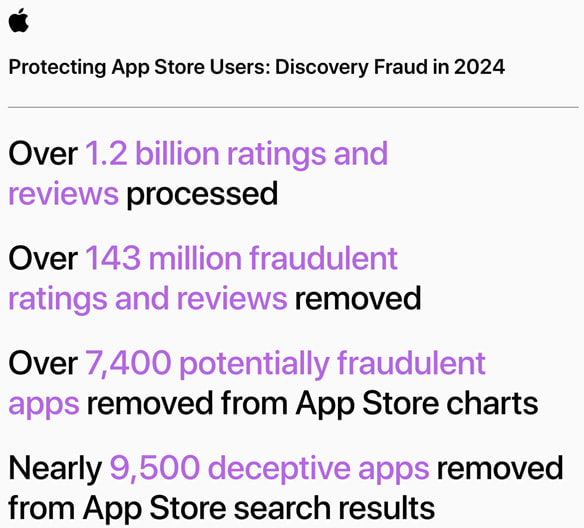
Apple announced it prevented over $2 billion in potentially fraudulent transactions on the App Store in 2024, contributing to over $9 billion in fraud prevention over the past five years.
The figures come from Apple’s annual App Store fraud analysis, highlighting the company’s multifaceted efforts to safeguard both users and developers in an increasingly hostile online landscape.
Apple terminated over 146,000 developer accounts linked to fraud last year and rejected an additional 139,000 suspicious developer enrollment attempts. On the user side, the company blocked over 711 million fake customer account creations and deactivated nearly 129 million accounts, many of which were tied to spam campaigns or attempts to manipulate App Store rankings.
The App Store, launched in 2008, is one of the world’s largest software marketplaces, hosting over 1.8 million apps and attracting more than 813 million visitors weekly. Available in 175 regions, it powers the app distribution and payment systems for developers ranging from independent creators to large software firms. Apple’s platform has long touted its security, relying on human reviewers and automated tools to vet approximately 150,000 app submissions weekly. In 2024, the App Review team evaluated over 7.7 million submissions, rejecting 1.9 million for security, privacy, and reliability concerns. This included over 400,000 apps rejected specifically for privacy violations and more than 320,000 flagged as spam, copycat apps, or user scams.

In the discovery and ranking space, Apple took aggressive action to prevent manipulation of App Store charts and search results. The company processed over 1.2 billion ratings and reviews last year, removing more than 143 million fraudulent entries. Additionally, it pulled more than 7,400 apps from store charts and nearly 9,500 deceptive apps from search results, effectively leveling the playing field for legitimate developers.
Apple also reported on its defenses against software piracy and unauthorized app distribution. It blocked over 10,000 pirated or malicious apps hosted on rogue storefronts, including gambling apps, pornography, and modified versions of legitimate apps. Over the past month alone, Apple stopped nearly 4.6 million attempts to install apps distributed outside the App Store or authorized third-party marketplaces. These efforts not only protect users from malware but also shield developers from having their work cloned, altered, or weaponized.
On the payment front, Apple identified nearly 4.7 million stolen credit cards in 2024 and banned over 1.6 million accounts from transacting again. Its payment systems, including Apple Pay and StoreKit, provide added security by using device-specific numbers and unique transaction codes, ensuring that actual credit card numbers are neither stored on devices nor shared with developers. Over 420,000 apps currently use these technologies to enable secure in-app purchases and subscriptions.
For users looking to defend themselves against app fraud, Apple recommends only downloading apps from the official App Store or authorized marketplaces, carefully reviewing app permissions, and regularly checking subscription settings and purchase histories within their Apple account. Developers are encouraged to adhere strictly to Apple’s App Review Guidelines and leverage built-in payment systems like StoreKit to provide secure transactions.







Leave a Reply